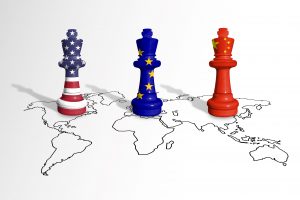You’ve heard the claim: “Nobody cares about the earth/the environment/climate change more than us”—with “us” usually being a large corporation or an industry group vying for favor with consumers or voters.Can you prove it isn’t true? Can the author of the slogan prove it’s not a lie? Such pronouncements are typical examples of green claims being abused in public relations and advertising messaging—abuse that has skyrocketed in recent years. To market their products or services, companies strive to convince consumers that they are more sensitive toward environmental challenges, or taking more effective action to reduce their environmental footprint, than their competitors.
Research has shown that over 50% of the commercial websites surveyed make unsupported environmental claims, with over 37% including claims that are outright misleading. As a result, the European Commission has put forward a proposal for an EU directive to regulate Green Claims. If passed by the European Parliament, it will still take time for the directive to come into effect in all member-states, but it will provide a benchmark for affirmative action toward more responsible environmental communication.
Environmental claims sometimes contain lies plain and simple: tampered-with emissions figures, for example. But overt lying is not the most detrimental offense, since lies can be exposed. Other methods—truisms and exaggerations, for instance, the use of complex scientific terms or misleading phrasing, doctored certifications, the presentation of marginal improvements as major breakthroughs, or setting ambitious corporate goals for spectacular results “by 2030” then burying them if they are not met—are more damaging forms of environmental deception, because they harm consumer trust.
At the most basic level, inaccurate claims can lead consumers to make less environmentally-responsible choices: should one buy a product that is 90% biodegradable or one that is three times more biodegradable than it used to be?
However, the damage from deceptive claims goes way beyond their impact on individual consumer choices.
Misleading green claims can lead to confusion and distrust as well as detracting from the public’s confidence that positive change can help the environment. This can affect political choices and subvert collective efforts to protect the planet and our quality of life on it. “Nobody ever tells the truth”; “they’re all liars”; “nothing will change, no matter what I do” become a common refrain among consumers.
As efforts to alleviate the climate crisis intensify in both the corporate and governmental sectors, deceptive promises harm consumers, the environment and those companies that actually do achieve significant results by investing in a greener future. Their example and very real achievements are simply lost amidst the cacophony of lies and half-truths.
Today’s consumers are intensely interested in companies, products, and services that do not harm the environment. They reward reduced environmental footprints and green innovation. Sometimes they do understand when they are being misled, but they cannot possibly assess every claim in every sector or navigate complex evidence and terminology, let alone misleading language.
“Six out of ten people believe we are the most sustainable!” or “The greenest solution!” or “Others just recycle, we genuinely care!”: if these made-up examples of green claims sound familiar, it’s because they are so close to the reality. Because a lack of supporting evidence, ambiguity, and hidden tradeoffs can cover up false claims or exaggerate the truth. The practice is more broadly known as ‘greenwashing’, which encompasses both the deliberate misleading of consumers regarding the environmental footprint of a company’s product or service and the combination of negative environmental performance with positive communication about this performance.
Greenwashing is a major challenge and regulation is urgently needed if it is to brought under control. Hopefully, the much-anticipated EU Green Claims Directive proposed last March will create a positive precedent. Beyond political interventions, however, self-regulation by companies and entire industries is essential if best practices are to be adopted in the making of environmental claims for marketing purposes.
On the other side of the ledger, we also need improved green literacy among consumers. We have to become more proficient at spotting valid and useful claims, selecting responsibly, and calling companies out when they actively set out to mislead.
Such literacy is not the sole responsibility of governments or NGOs. The best way for companies to demonstrate their rejection of greenwashing and make their claims credible is to invest in training their own consumers in their sector’s environmental footprint and the initiatives that still need to be taken. That way, they can prove that they really do care about the environment by being environmentally responsible and talking responsibly about it.
* Dr. Miliopoulou is Associate Professor of Communication at Deree -The American College of Greece


